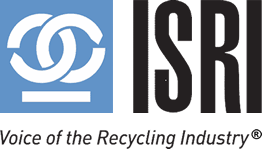Celebrate ISRI’s
HISTORY & Future
HISTORY & Future
Roads and bridges that connect us. Electrical wires that power our homes. Hospital ventilators that sustain life. For more than 100 years, the recycled materials industry has provided resources that Americans depend on—from everyday items to essential infrastructure—by inventing new solutions and technologies.
See how ISRI and our members have served as the voice for an industry that’ssecuring our nation’s supply chain while ensuring a more sustainable future.
1900s
An Industry
Born of Ingenuity
Born of Ingenuity
EARLY 1900s
SEEKING BETTER
LIVES IN AMERICA
LIVES IN AMERICA
During the Second Industrial Revolution—which started in the late 1800s—millions of immigrants seek better lives in America. Many find opportunity as peddlers of recycled metals, paper, rags, glass, bones, hides, and other materials. At the same time, the recycled materials industry starts mechanizing through the use of materials like gas-cutting torches, alligator shears, and lifting magnets.
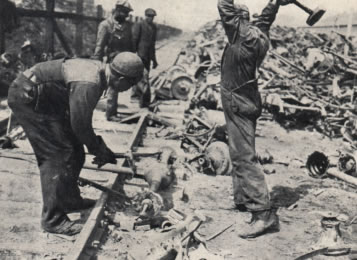
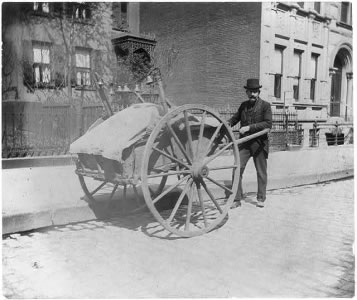
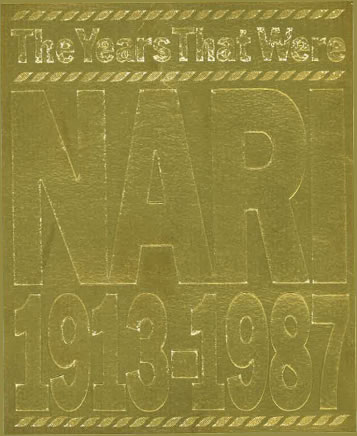
1913
The National
Association of Waste
Material Dealers is
formed in Boston.
Association of Waste
Material Dealers is
formed in Boston.
The National Association of Waste Material Dealers is formed in Boston. The group renames itself to the National Association of Secondary Material Industries in 1960, and the National Association of Recycling Industries in 1974.
1914 – 1915
FIRST INDUSTRY
SPECIFICATIONS
PUBLISHED
SPECIFICATIONS
PUBLISHED
The National Association of Recycling Industries—the predecessor to the Institute of Scrap Recycling Industries (ISRI)—publishes the first industry specifications, now known as the ISRI Specifications Circular. Still used today, the Circular provides guidelines for buying and selling a variety of processed scrap commodities.
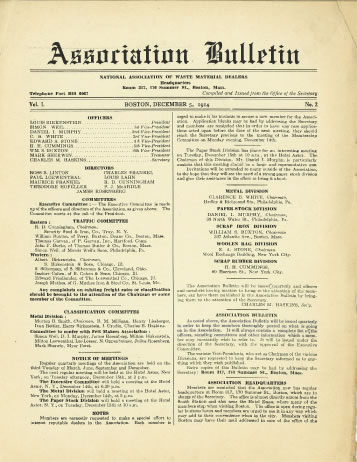

1916 – 1918
Addressing shortages
during world war i
during world war i
Recycling rises to meet wartime demand during World War I, helping to address shortages of raw materials needed for weapons, tanks, and ships. The slogan, “Don’t Waste It–Save It.” becomes a rallying cry.
1920s
A Second
Trade Association
Trade Association
1928
The institute of scrap
iron and steel was
born
iron and steel was
born
20 or so ferrous scrap recyclers come together in New York City to form the group that becomes the Institute of Scrap Iron and Steel, the recycled materials industry’s second national trade association. The organization would later establish a research foundation to drive recycling production and quality standards.
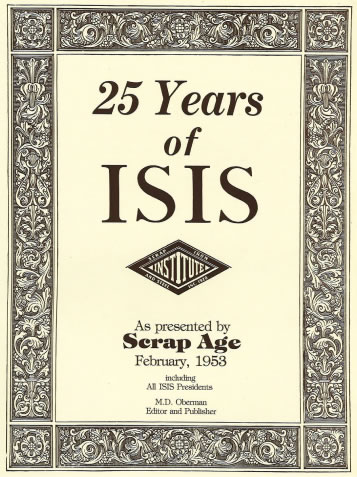
1940s
Essentials for
the War Effort
the War Effort
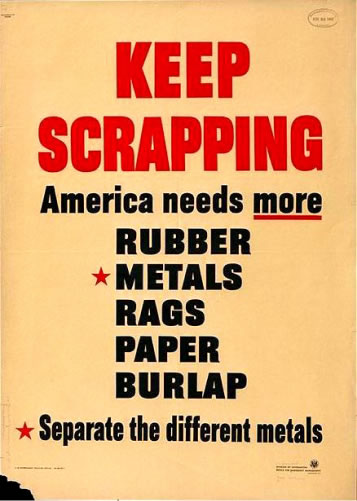
1940s
The start of recycling
drives
drives
Recycling demand rises to meet U.S. war production needs during World War II. Citizens participate in recycling drives to collect everything from clothes and paper to metals and rubber.
1980s
Organizing To
Strengthen Our Industry
Strengthen Our Industry
JANUARY 1980
A Lifelong career in
recycling
recycling
ISRI Century Club member Barry Wolff details what his lifelong career in the recycled materials industry and ISRI mean to him.
JUNE 1980
Industry was
beginning to grow up
beginning to grow up
Association leaders meet to discuss the value and origin of organization.
1987
ISRI WAS BORn
The Institute of Scrap Iron and Steel and the National Association of Recycling Industries merge to form the Institute of Scrap Recycling Industries (ISRI).

JUNE 1987
A Merger for the Ages
ISRI Century Club Co-Chair Barry Hunter remembers the task of merging ISRI predecessor organizations ISIS and NARI to form ISRI in 1987.
1990s
Passing Key Legislation

1999
Superfund recycling
equity act
equity act
ISRI and our members secure passage of the Superfund Recycling Equity Act (SREA), after intense lobbying and grassroots efforts. SREA corrects an unintended consequence of the Superfund that resulted in hundreds of millions of dollars of Superfund liability being imposed on the recycling industry.
2000s
Growing Strong
and Sustainably
and Sustainably
2001
Acquisition of tires
and rubber
and rubber
ISRI acquires the National Association of Scrap Tire Processors, whose members become our Tire and Rubber Division and Scrap Tire Processors Chapter.
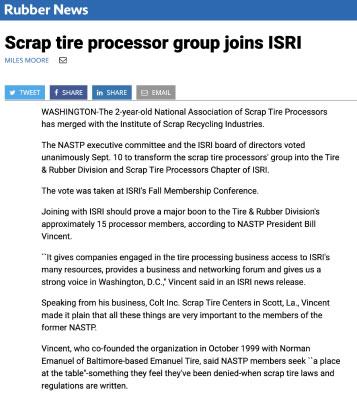
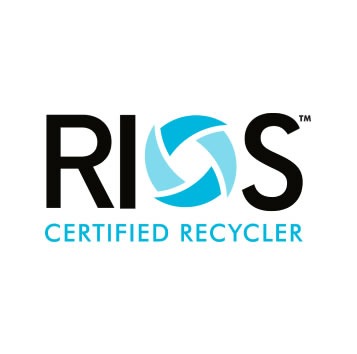
2003
RIOS is developed
ISRI develops RIOS™, the Recycling Industry Operating Standard™, the first management system standard designed for the recycled materials industry. The RIOS™ approach has since been adopted by companies across all industries because of its effectiveness in addressing Quality, Environmental, Health, and Safety risks and impacts.
2004
ISRI Defeats Effort to Impose Export Controls on Copper and Brass
ISRI and our members defeat efforts by the copper and brass industry to impose export controls on recycled copper and copper-alloy.

2005
Addressing industry
safety and
environmental
challenges
safety and
environmental
challenges
ISRI forms the National Safety Committee (later renamed the ISRI Safety and Environmental Council) to address the industry’s safety and environmental challenges.
2006
National Vehicle
Mercury Switch
Recovery Program
Mercury Switch
Recovery Program
ISRI collaborates with the U.S. Environmental Protection Agency and other groups to establish the National Vehicle Mercury Switch Recovery Program, designed to remove up to 90% of mercury light switches from recycled vehicles.
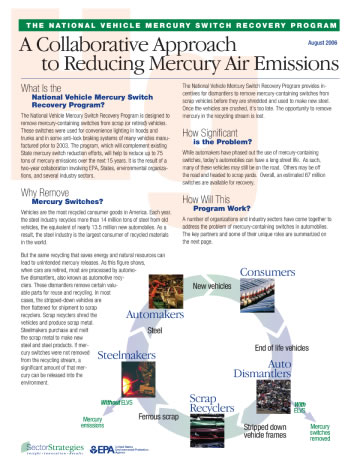
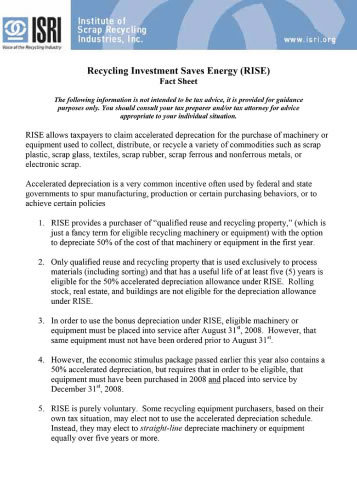
2008
The rise act
ISRI successfully lobbies Congress to enact the RISE Act, a depreciation allowance on recycling equipment. RISE allows taxpayers to claim accelerated depreciation for the purchase of machinery or equipment used to collect, distribute, or recycle a variety of commodities.
2008
ISRI acquires the
International
Association of
Electronics Recyclers
International
Association of
Electronics Recyclers
IAER represented and served the interests of the electronics recycling industry as a key element in the development of an effective and efficient infrastructure for managing the life cycle of electronic products.

2010s
Leading the Way
for Worker Safety
for Worker Safety

2014
ISRI creates the circle
of safety excellence
of safety excellence
The (COSE) program, is the culmination of our safety programs and services. COSE helps us prioritize worker, vehicle, and facility safety within the recycling industry. Member companies share best practices and safety data to help drive evidence-based safety practices and benchmarks.
2020s
Ushering in a New Era
2020
Celebrating Heritage While Looking to the Future
Formation of ISRI’s century club and the vital role they plan in maintaining the heritage of the recycled materials industry.
2022
ISRI leading the way
ISRI continues to lead the way for promoting new technologies and processes such as using artificial intelligence (AI) for detecting and separating recyclables based on factors like shape, density, elemental composition, and color. ISRI maintains its efforts to partner with consumer brands and companies to help them recycle more, use more recycled materials, and design their products to be recycled more easily—supporting national and global decarbonization goals.
☰
×

